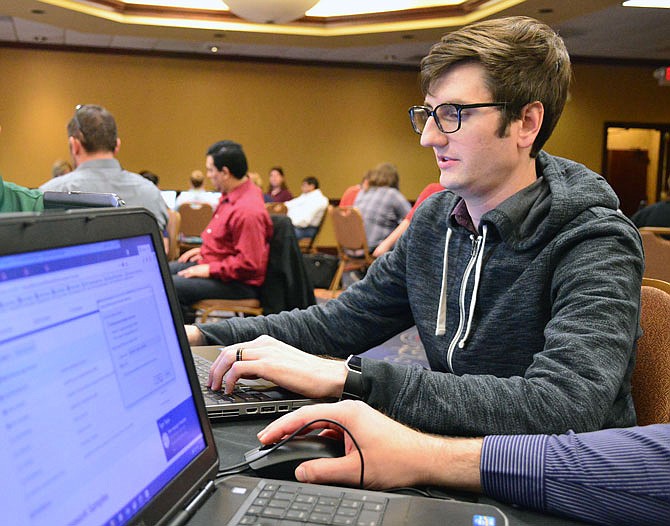Developers from the Missouri Office of Administration hacked, hacked and hacked again during a two-day training seminar and competition hosted with Microsoft at the Capitol Plaza Hotel in Jefferson City.
Microsoft hosted the training seminar Tuesday and Wednesday to train employees on its cloud-computing platform, Azure. During a competition Wednesday, 56 OA developers split into teams to find solutions for problems using Azure.
Microsoft employees trained OA developers to use Azure Government, a version of Azure software designed to be secure enough for government use, by showing them ways things can be integrated on the platform. A day-long competition gave the department's developers a chance to use Azure for real-world purposes, OA Director of Application Development Nikki Veit said.
"Most of the people in this room have never worked in Azure before," Veit said. "So everybody that's in this room is doing something that's completely foreign to them."
The state began using Azure about two years ago during a shared development project with the state of Arizona for the Missouri Department of Natural Resources, Veit said. Currently, Missouri uses Azure for a handful of other uses and wants to find more ways to incorporate it, Veit added.
Teams in Wednesday's competition worked to find new ways to use Azure by solving real problems the state faces.
Tyler Heinrich, a developer for OA's information technology services division, and his team used the software to develop a chat bot that uses artificial intelligence to respond to user questions for the Missouri Department of Higher Education. The system works by searching through a database or repository of answers to questions and using those to solve users' problems.
Heinrich said the system works better than posting a list of generic questions and answers online or using manpower to answer user questions via phone or internet.
"It's just an easy way for them to ask questions and get answers without necessarily having to have that human interaction with it," Heinrich said. "They don't have to wait 10-15 minutes to contact some customer service person to explain something to them."
The team tried to make the bot sound human. In one exchange with the bot, Heinrich asked, "How are you doing?" The bot responded, "Living the dream."
Heinrich said the team wanted the bot to use natural language but also wanted to be transparent to users that a computer was answering them.
"I tried to make mine witty," Heinrich said.
Anthony Zadel, a developer in OA's information technology services division, worked to develop a program for the Department of Elementary and Secondary Education that could read writing on a photo of a physical sheet of paper and upload it into a form on a digital file. Zadel said the department could use the tool to solve problems in places without great internet access and prevent employees from spending time entering forms by hand in the field and again digitally.
Josh Gass, who supervises an OA application development team, worked on a chat bot similar to Heinrich's for the Department of Labor.
Gass works mostly with Java Software in his job. He said the competition helped him learn what Azure allows developers to do.
"It's nice to see how it would be useful," Gass said. "I've learned a lot of stuff I would like to see us using in the future that we're just not right now."
Microsoft routinely uses competitions like this - commonly known as "hackathons" - to train people around the country. A panel of judges from the state judged presentations Wednesday afternoon. Microsoft awarded plaques to the teams that placed first, second and third.
Microsoft brought in people from outside the region and outside the state to show OA developers day-to-day uses. Microsoft Account Technology Specialist Brett Woods also wanted the state's developers to learn new ideas about how Azure can be used.
Woods said Azure does not replace state-owned data centers, but allows the state to use its existing data centers for more tools by relying on cloud-based services from Microsoft to perform much of the work done by these new services.
"You could really look at it as a Swiss army knife that Microsoft houses in their data centers," Woods said. "This allows (the state of Missouri) to expand that data center but not necessarily buy the hardware - just make use of the services."

